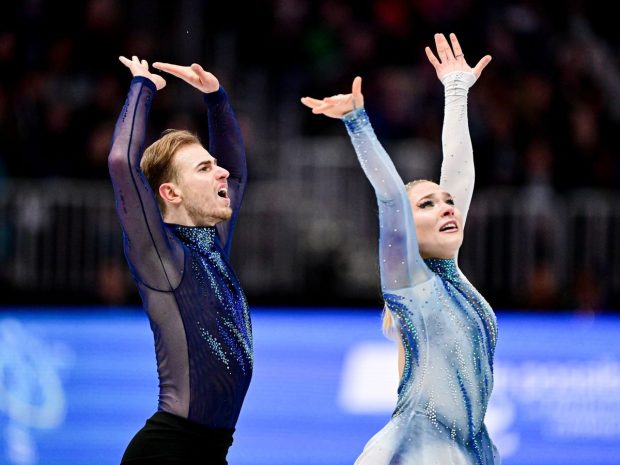The first question about Pete Rose’s reinstatement is obvious: Why did Major League Baseball commissioner Rob Manfred reverse course? Though Rose’s attorney and oldest daughter surely made heartfelt pleas on behalf of the all-time hit king, it’s reasonable to wonder if pressure on Manfred from President Donald Trump had a greater impact.
Advertisement
If Trump did indeed help persuade the commissioner, it leads to another question: Can the president succeed in lobbying Rose into the Hall of Fame? Here’s guessing that influencing the Hall’s committee process would be more challenging, but after Manfred’s stunning decision Tuesday to posthumously remove Rose, Shoeless Joe Jackson and others from the permanently ineligible list, who can say for sure?
Rose, who died on Sept. 30, wanted nothing more than to be enshrined in Cooperstown, but said on multiple occasions that it would never happen while he was alive. His former lawyer, Jeffrey Lenkov, and oldest daughter, Fawn Rose, met with Manfred on Dec. 17 about taking the first step in that effort, and removing him from the ineligible list. Trump, who has been quite public in his support of Rose, met with Manfred at the White House on April 17. Manfred acknowledged Rose was a point of discussion. He certainly was a more likely topic than, say, the state of the Colorado Rockies.
The ban Rose accepted in 1989 for betting on baseball was “permanent,” not “lifetime.” Based on that language alone, Manfred could have reasonably justified extending the penalty into perpetuity. In 2022, after receiving a letter from Rose asking for forgiveness, Manfred told the Baseball Writers Association of America,“I believe that when you bet on baseball, from Major League Baseball’s perspective, you belong on the permanently ineligible list.”
But in a letter to Lenkov, who had petitioned Manfred for Rose’s reinstatement, the commissioner wrote on Tuesday, “In my view, a determination must be made regarding how the phrase ‘permanently ineligible’ should be interpreted regarding Rule 21,” which addresses betting on baseball by people in the sport. “Obviously, a person no longer with us cannot represent a threat to the integrity of the game.”
Advertisement
Did Rose’s death soften Manfred? Was the case presented to the commissioner by Rose’s lawyer and daughter singularly moving? Doubtful on both counts, considering Manfred’s resistance to reinstating Rose in the past. Only after Trump entered the picture did the commissioner do an about-face.
Manfred is nothing if not shrewd. He surely did not want to risk the president embarrassing him publicly on social media. He also likely did not want to get on Trump’s wrong side at a time when he is pushing for a direct-to-consumer streaming service for the league, and the migration from broadcast to streaming by professional sports leagues is under government scrutiny. Also, while Trump is known to be pro-management, it’s not out of the realm of possibility that, if sufficiently annoyed, he could threaten baseball’s antitrust exemption.

Rose was joined by his son Pete Jr. (left) and attorneys in December 2015 at a press conference in Las Vegas after MLB denied his request for reinstatement at the time. (The Enquirer/Sam Greene / USA TODAY NETWORK via Imagn Images)
Reinstating Rose, at least in a narrow, short-term view, comes at little cost. The Hall of Fame is the true prize for Rose’s supporters. And while Manfred sits on the Hall’s Board of Directors, he can safely distance himself from whatever decision is made on Rose’s Cooperstown fate. As the commissioner wrote in his letter to Lenkov, “I want to emphasize that it is not part of my authority or responsibility to express any view concerning Mr. Rose’s consideration by or possible election to the Hall of Fame.”
The BBWAA never got the chance to vote on Rose. Under a rule adopted by the Hall’s board in 1991 – one and a half years after Rose agreed to his ban, and the same year he would have been on the writers’ ballot for the first time – a player on the ineligible list cannot be considered for election to the Hall. Rose’s removal from that list changes nothing for the writers; his eligibility for our ballot has expired.
Now that Rose is reinstated, the way for him to gain induction is by passing muster with two Hall committees. The first is a BBWAA-appointed and Board-approved Historical Overview Committee, a group that conducts an initial screening process and seemingly would rubber stamp Rose’s candidacy to allow him a full hearing. The second is a 16-member Era Committee comprised of Hall of Famers, executives and veteran media members.
Advertisement
The Era Committees work on three-year rotations. Without directly referring to Rose and Jackson, the Hall’s chairman of the board, Jane Forbes Clark, said in a statement that players removed from the permanently ineligible list would be classified in the Classic Baseball Era, which covers players who made their greatest impact before 1980. Thus, Rose and Jackson will be eligible for induction in the winter of 2027, as part of the class of 2028.
Each of the eight candidates on an Era Committee ballot must receive 75 percent approval. Rose, then, would need 12 voters willing to overlook his past indiscretions. His alleged sexual relationship with a girl under 16 in the 1970s (which he has denied, acknowledging the relationship but saying she was 16 at the time). His five-month prison sentence for tax evasion in 1990. And, of course, his betting on baseball.
The Era Committee presumably would weigh not just Rose’s 4,256 hits but also the implications of electing him, the message it would send, the precedent it would set. Manfred’s decision on Rose, Jackson and other members of the 1919 Black Sox might have almost immediate ramifications. The possibility of a current player betting on baseball hardly is far-fetched.
As professional sports leagues partner with gambling companies, the integrity of the game arguably is in greater jeopardy than it was during Rose’s day. The Athletic and other media entities engage in similar partnerships. Advertisements promoting legalized gambling are difficult to escape.
Ippei Mizuhara, the person once closest to baseball’s biggest star, Shohei Ohtani, soon will begin a 57-month prison sentence for stealing nearly $17 million from Ohtani’s bank account to pay off approximately $40 million in gambling debts. Prosecutors said Mizuhara never bet on baseball. But the potential certainly was there.
Given all this, the makeup of the committees that consider Rose will be critical. The leanings of those voters often determine how controversial candidates fare.
It’s not all that difficult to imagine Trump calling out individual committee members, whose identities are revealed a few days before the committee meets. The president has said he would pardon Rose. But the tax evasion conviction is the only one of Rose’s issues Trump could forgive. And that is not what kept Rose out of Cooperstown, where Trump clearly feels he belongs.
Advertisement
Commenting on his social media platform, Truth Social, after Rose’s death, Trump described the 17-time All-Star as “one of the most magnificent players ever to play the game.” The president added, “He paid the price! Major League Baseball should have allowed him into the Hall of Fame many years ago.”
Many baseball fans agree with Trump. And some of the concerns about honoring Rose are not as strong as they were when he was alive.

Rose holds a star bearing his name and number before a Cincinnati Reds game in June 2016. (Sam Greene / USA TODAY NETWORK via Imagn Images)
The fear of Rose commercializing his election to excess is gone. He no longer is around to peddle his autographs the way he once did during Hall of Fame weekend in Cooperstown, setting up in shops on Main Street in a crass display that made Hall officials cringe.
If elected, Rose’s contributions to the game finally would be recognized. His family and friends finally would celebrate an honor they consider long overdue. And the Hall, it can be argued, would become more complete.
Our society frequently is willing to forgive misconduct by famous figures. Prominent politicians, sports and entertainment figures routinely are afforded second acts. Rose for years argued he deserved the same.
Does he now?
The issues with Rose’s candidacy are not directly analogous to the issues with other problematic candidates for the Hall. But the induction of Rose would run contrary to certain standards the majority of BBWAA voters followed in recent elections. Again, this is not a BBWAA choice. Era Committees exist to correct perceived BBWAA oversights. But how far will a committee be willing to extend for Rose?
BBWAA voters for the Hall have drawn a line on many candidates who were suspected or confirmed users of performance-enhancing drugs. Alex Rodríguez and Manny Ramirez, two candidates who, like Rose, violated known rules, have fared even worse than players like Barry Bonds and Roger Clemens, who mostly played in the pre-testing era and never tested positive. The statistics of each of those players are worthy of the Hall of Fame.
Advertisement
A player whose career was more borderline, Omar Vizquel, saw his candidacy fade after The Athletic reported in 2020 that his ex-wife, Blanca, accused him of abuse and a batboy with autism accused him of harassment. Vizquel denied abusing his ex-wife and reached a confidential settlement with the bat boy. He has only two years of BBWAA eligibility remaining.
Allegations that Rose had sex with a minor surfaced in a 2017 defamation lawsuit he filed against John Dowd, MLB’s lead investigator into Rose’s gambling. Dowd claimed in a radio interview that Rose committed statutory rape. Rose called the allegation “entirely false in every respect.” A motion filed in Dowd’s defense included a sworn statement by an unidentified woman alleging that Rose had a sexual relationship with her before she turned 16.
The Hall instructs BBWAA voters to base their choices “upon the player’s record, playing ability, integrity, sportsmanship and contribution to the team(s) on which the player played.” Those who support Rose’s entry into the Hall might argue only performance matters, making the same case as those who support players of questionable character like Vizquel, and players linked to PEDs. Rightly or wrongly, that position has failed to sway BBWAA voters. It also failed to sway the Contemporary Baseball Era Committee that considered but did not elect Bonds and Clemens in Dec. 2022.
As Manfred’s reversal on Rose shows, standards are not immutable, particularly under a president trying to impose his will. Trump did not rise to the defense of Bonds and Clemens. He rose to the defense of Rose. Whole new ballgame.
(Top photo of Pete Rose in 2016: Kirk Irwin / Getty Images)
This news was originally published on this post .








Be the first to leave a comment